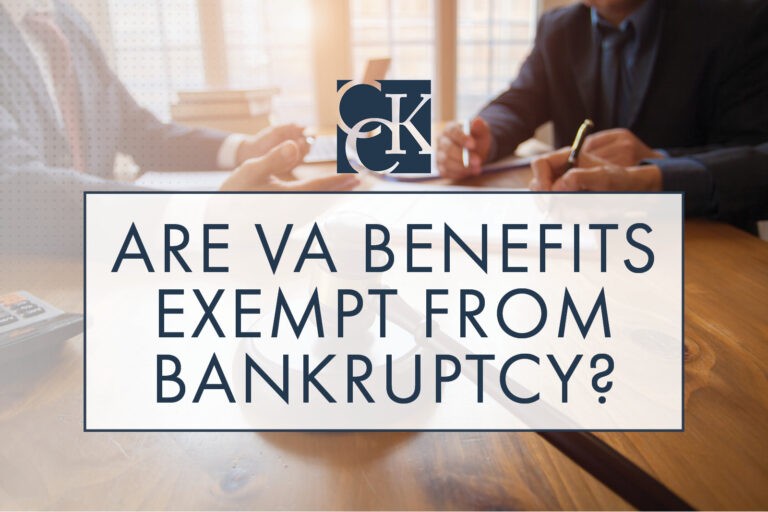Are VA Benefits Exempt from Bankruptcy?

CCK Law: Our Vital Role in Veterans Law
Yes, following the HAVEN Act in 2019, VA disability compensation is exempt from bankruptcy. This means that VA disability benefits are considered protected income during bankruptcy proceedings.
Prior to the HAVEN Act – from 2005 to 2019 – the federal Bankruptcy Code commonly required veterans to give up their VA disability benefits to creditors to obtain bankruptcy relief.
Again, if you are filing for bankruptcy and dealing with bankruptcy proceedings today, your VA disability benefits are protected from bankruptcy under federal law.
What Is the HAVEN Act?
The Honoring American Veteran’s in Extreme Need Act, or HAVEN Act, was signed into law in 2019.
This Act effectively protects military veterans and their families during bankruptcy proceedings by excluding Department of Veterans Affairs (VA) and Department of Defense (DoD) disability payments from the definition of Current Monthly Income under 11 U.S.C. § 101(10A). Essentially, the HAVEN Act places VA disability benefits in the same protected category as Social Security Disability Insurance.
Specifically, the following benefits are protected under the HAVEN Act:
- VA Disability Compensation: A tax-free monthly monetary benefit for veterans who have one or more qualifying service-connected conditions (i.e., conditions incurred in or caused by active military duty.)
- VA Dependency and Indemnity Compensation: A tax-free monetary benefits paid to eligible survivors of military service members who died in the line of duty or eligible survivors of veterans whose death resulted from a service-connected condition.
- VA Veterans Pension: Also called veterans Non-Service-Connected Disability Pension, this benefit is a needs-based program for wartime veterans who are ages 65 or older or have a permanent and total non-service-connected disability, and who have limited income and net worth.
- Permanent Disability Retired Pay
- Temporary Disability Retired Pay
- Retired of Disability Severance Pay for Pre-Existing Conditions
- Disability Severance Pay
- Combat Related Special Compensation
- Survivor Benefit Plan for Chapter 61 Retirees
- Special Survivor Indemnity Allowance
- Special Compensation for Assistance with Activities of Daily Living
How to File a Disability Claim
If you are a U.S. military veteran and have a disabling medical condition related to your active-duty service, you can file a claim for VA disability benefits.

Veterans are required to submit VA Form 21-526EZ – Application for Disability Compensation and Related Compensation Benefits – to start the VA claims process for service-connected compensation. VA provides multiple ways for veterans to file their claims:
- Online – using VA.gov.
- By mail– directed to the Department of Veterans Affairs, Evidence Intake Center, PO Box 4444 in Janesville, WI 53547-4444.
- In-person– bringing a completed VA Form 21-526EZ to the nearest VA Regional Office.
- With a legal representative– completing the form with a Veterans Service Organization (VSO) or a VA-accredited agent or attorney.
Generally, filing a VA claim online is the fastest and most convenient way to apply for disability benefits.
Am I Eligible for VA Disability?
To qualify for VA disability benefits, you must have (1) served on active duty in one of the branches of the United States military; and (2) received an other-than-dishonorable discharge.
In addition to these criteria, you must also meet the requirements for service connection. To establish service connection for a service-related disability, you must have:
- Evidence of an in-service event, injury, or illness;
- A current diagnosis of a disabling condition by a medical professional; and
- A nexus, or link, between the in-service event and current disability.
Was Your Disability Claim Denied?
If you are in the process of filing for bankruptcy, you may not have the time and resources to handle the VA appeal process on your own. Chisholm Chisholm & Kilpatrick offers free case evaluations to veterans and family members looking for assistance with their appeals. Contact us today to learn more by calling (800) 544-9144.
About the Author
Share this Post
